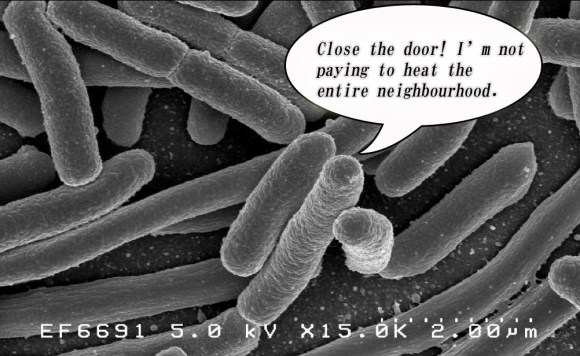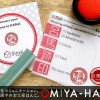
A Fukui University team has discovered a connection between a child’s development and the amount of bacteria in a mother’s intestines – even after birth.
In a report published by American journal PLOS ONE on 20 January, the team performed a series of tests on mice mothers and children by administering antibiotics to disrupt their balance of gut bacteria. They found that the offspring of mice with reduced bacteria in their intestines had roughly 12 percent less body weight compared to those born from regular mice.
Several other abnormalities were observed as well such as reduced movement, lower nocturnal activity, and a tendency to only move along the walls of enclosures due to anxiousness.
▼ Oh Ginger… What’s the matter? Didn’t your mother have enough intestinal bacteria?
Due to this, it is believed that the presence of gut bacteria in the mother is more important to the development of their children than initially thought, as the child ingests some of the microbes and uses them for their own growth when passing through the birth canal. Afterwards, more of these benevolent organisms are passed from mother to child through breast feeding.
The researchers also took mother mice with normal intestinal bacteria who delivered babies and then soon after lowered their levels. Although the weights were fine, certain developmental disorders in the young mice, such as reduced activity at night, appeared. They also reversed the test by giving mice that were born from mothers with reduced bacteria to regular mothers and found that they had normal behavior. These findings suggest that the bacteria levels are just as important after birth as during pregnancy.
Why this happens is uncertain, but the Fukui University team is anxious to unravel the mechanisms at work here. Ultimately they hope to develop treatments or screening methods for developmental disorders, but in the mean time, Associate Researcher Shiro Tochitani advises mothers and mothers-to-be to try to keep their intestinal bacteria regulated by eating probiotics like yogurt.
That’s actually quite noble advice since this study was partially funded by Yakult, the makers of a widely-used fermented milk drink in Japan and rival of yogurt. We’ll go ahead an plug it as a good probiotic option for mothers too, since Tochitani is too classy to do it himself.
Source: PLOS ONE (English) via Yahoo! Japan News (Japanese)
Top Image: Wikipedia/NIAID (Edited by RocketNews24)
Video: YouTube/Matthew Bayliss

 Instant ramen with 40 billion lactic acid bacteria on sale now
Instant ramen with 40 billion lactic acid bacteria on sale now Yakult opens a dessert store in Japan and releases a new ice cream in supermarkets
Yakult opens a dessert store in Japan and releases a new ice cream in supermarkets Hey everyone, Japanese soccer player Keita Suzuki wants your poop!
Hey everyone, Japanese soccer player Keita Suzuki wants your poop! Fish-and-Evangelion-inspired oxygen enema treatment developed by Japanese researchers
Fish-and-Evangelion-inspired oxygen enema treatment developed by Japanese researchers Food by Fujitsu: Rise of the super veggie!
Food by Fujitsu: Rise of the super veggie! McDonald’s new Happy Meals offer up cute and practical Sanrio lifestyle goods
McDonald’s new Happy Meals offer up cute and practical Sanrio lifestyle goods All-you-can-drink Starbucks and amazing views part of Tokyo’s new 170 meter-high sky lounge
All-you-can-drink Starbucks and amazing views part of Tokyo’s new 170 meter-high sky lounge Studio Ghibli glasses cases let anime characters keep an eye on your spectacles
Studio Ghibli glasses cases let anime characters keep an eye on your spectacles More foreign tourists than ever before in history visited Japan last month
More foreign tourists than ever before in history visited Japan last month Kyoto’s 100 Demons yokai monster parade returns!
Kyoto’s 100 Demons yokai monster parade returns! Starbucks reopens at Shibuya Scramble Crossing with new look and design concept
Starbucks reopens at Shibuya Scramble Crossing with new look and design concept Beautiful Sailor Moon manhole cover coasters being given out for free by Tokyo tourist center
Beautiful Sailor Moon manhole cover coasters being given out for free by Tokyo tourist center Super Nintendo World expansion gets delayed for several months at Universal Studios Japan
Super Nintendo World expansion gets delayed for several months at Universal Studios Japan Dodge the biggest problem of giving yourself a kanji name with these for-foreigner personal seals
Dodge the biggest problem of giving yourself a kanji name with these for-foreigner personal seals A visit to the best UFO catcher arcade in the universe!
A visit to the best UFO catcher arcade in the universe! Disney princesses get official manga makeovers for Manga Princess Cafe opening in Tokyo
Disney princesses get official manga makeovers for Manga Princess Cafe opening in Tokyo Beautiful new Final Fantasy T-shirt collection on the way from Uniqlo【Photos】
Beautiful new Final Fantasy T-shirt collection on the way from Uniqlo【Photos】 Is the new Shinkansen Train Desk ticket worth it?
Is the new Shinkansen Train Desk ticket worth it? Foreign English teachers in Japan pick their favorite Japanese-language phrases【Survey】
Foreign English teachers in Japan pick their favorite Japanese-language phrases【Survey】 Japanese convenience store packs a whole bento into an onigiri rice ball
Japanese convenience store packs a whole bento into an onigiri rice ball We try out “Chan Ramen”, an underground type of ramen popular in the ramen community
We try out “Chan Ramen”, an underground type of ramen popular in the ramen community Studio Ghibli releases Kiki’s Delivery Service chocolate cake pouches in Japan
Studio Ghibli releases Kiki’s Delivery Service chocolate cake pouches in Japan Japan’s bone-breaking and record-breaking roller coaster is permanently shutting down
Japan’s bone-breaking and record-breaking roller coaster is permanently shutting down New definition of “Japanese whiskey” goes into effect to prevent fakes from fooling overseas buyers
New definition of “Japanese whiskey” goes into effect to prevent fakes from fooling overseas buyers Our Japanese reporter visits Costco in the U.S., finds super American and very Japanese things
Our Japanese reporter visits Costco in the U.S., finds super American and very Japanese things Studio Ghibli unveils Mother’s Day gift set that captures the love in My Neighbour Totoro
Studio Ghibli unveils Mother’s Day gift set that captures the love in My Neighbour Totoro Foreign passenger shoves conductor on one of the last full runs for Japan’s Thunderbird train
Foreign passenger shoves conductor on one of the last full runs for Japan’s Thunderbird train Domino’s Japan now sells…pizza ears?
Domino’s Japan now sells…pizza ears? New Japanese KitKat flavour stars Sanrio characters, including Hello Kitty
New Japanese KitKat flavour stars Sanrio characters, including Hello Kitty Kyoto creates new for-tourist buses to address overtourism with higher prices, faster rides
Kyoto creates new for-tourist buses to address overtourism with higher prices, faster rides Sales of Japan’s most convenient train ticket/shopping payment cards suspended indefinitely
Sales of Japan’s most convenient train ticket/shopping payment cards suspended indefinitely Sold-out Studio Ghibli desktop humidifiers are back so Totoro can help you through the dry season
Sold-out Studio Ghibli desktop humidifiers are back so Totoro can help you through the dry season Japanese government to make first change to romanization spelling rules since the 1950s
Japanese government to make first change to romanization spelling rules since the 1950s Ghibli founders Toshio Suzuki and Hayao Miyazaki contribute to Japanese whisky Totoro label design
Ghibli founders Toshio Suzuki and Hayao Miyazaki contribute to Japanese whisky Totoro label design Doraemon found buried at sea as scene from 1993 anime becomes real life【Photos】
Doraemon found buried at sea as scene from 1993 anime becomes real life【Photos】 Tokyo’s most famous Starbucks is closed
Tokyo’s most famous Starbucks is closed One Piece characters’ nationalities revealed, but fans have mixed opinions
One Piece characters’ nationalities revealed, but fans have mixed opinions We asked a Uniqlo employee what four things we should buy and their suggestions didn’t disappoint
We asked a Uniqlo employee what four things we should buy and their suggestions didn’t disappoint Princesses, fruits, and blacksmiths: Study reveals the 30 most unusual family names in Japan
Princesses, fruits, and blacksmiths: Study reveals the 30 most unusual family names in Japan Japanese teens develop anti-fart underwear that blocks smell and sound of flatulence
Japanese teens develop anti-fart underwear that blocks smell and sound of flatulence Research from Japanese university claims kissing pets can cause stomach cancer
Research from Japanese university claims kissing pets can cause stomach cancer Nasal spray that could alleviate symptoms of Autism Spectrum Disorder now in clinical trials
Nasal spray that could alleviate symptoms of Autism Spectrum Disorder now in clinical trials Kyoto University finds alpacas may hold the key to preventing all COVID-19 variants
Kyoto University finds alpacas may hold the key to preventing all COVID-19 variants Fear of food produced in China continues as new report claims at least 48% of it will make you sick
Fear of food produced in China continues as new report claims at least 48% of it will make you sick Japanese mobile game has anime girls asking you detailed questions about your poop
Japanese mobile game has anime girls asking you detailed questions about your poop Fart-muffling and deodorizing cushions are set to make Japan’s offices less noisy/stinky
Fart-muffling and deodorizing cushions are set to make Japan’s offices less noisy/stinky Crazy Japanese “doctor” thinks babies live in clouds, choose their mothers from the heavens
Crazy Japanese “doctor” thinks babies live in clouds, choose their mothers from the heavens Japan now has a traffic safety video for cats to watch to help keep them safe on the streets
Japan now has a traffic safety video for cats to watch to help keep them safe on the streets New study suggests Japanese people born in late winter at higher risk of suicide
New study suggests Japanese people born in late winter at higher risk of suicide 49-year-old Japanese shut-in spends weeks living with corpse of mother who died at home
49-year-old Japanese shut-in spends weeks living with corpse of mother who died at home Japanese researchers create chickens that lay eggs containing valuable medicine
Japanese researchers create chickens that lay eggs containing valuable medicine 6 surprising things about having a baby in Japan
6 surprising things about having a baby in Japan Japan seems just a little more terrifying with discovery of local leech’s superpower
Japan seems just a little more terrifying with discovery of local leech’s superpower Japanese sake breaks new ground with a variety specially blended to pair well with chocolate
Japanese sake breaks new ground with a variety specially blended to pair well with chocolate
Leave a Reply